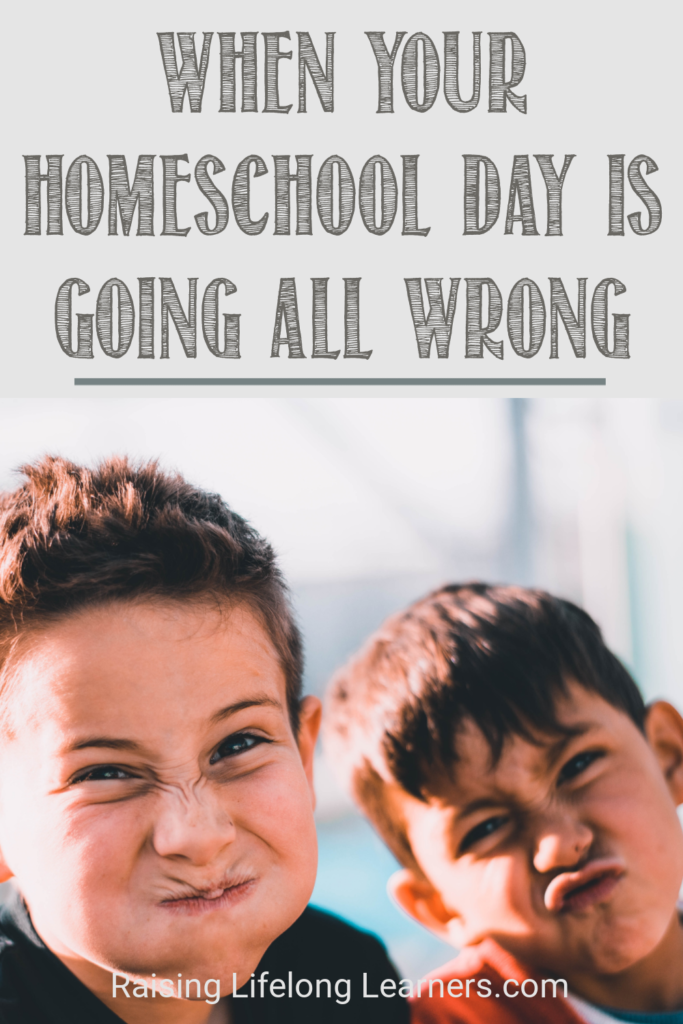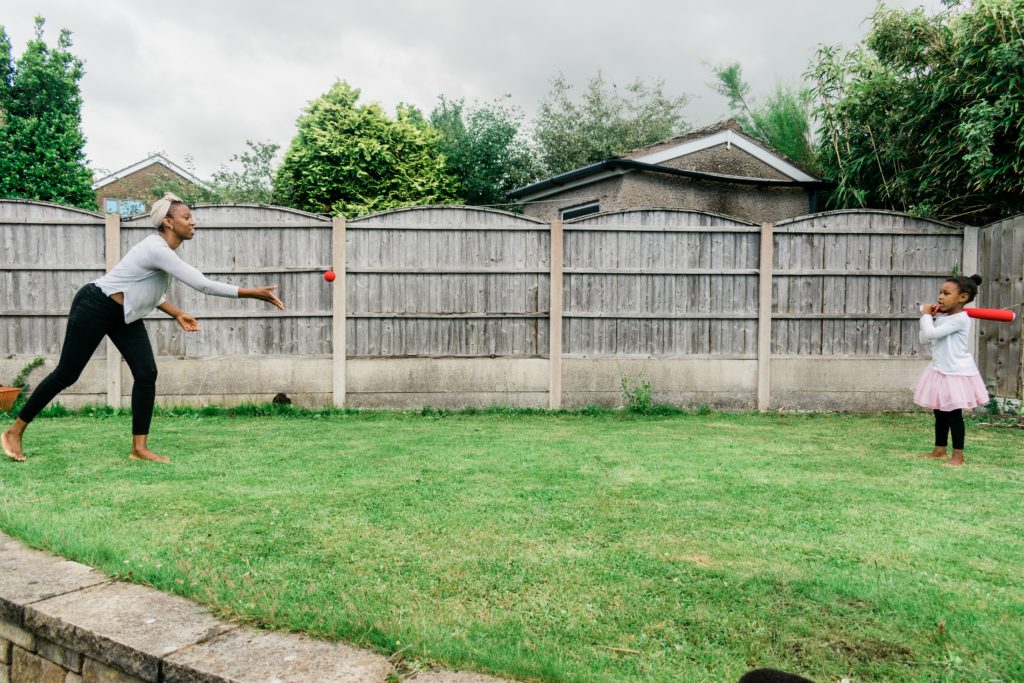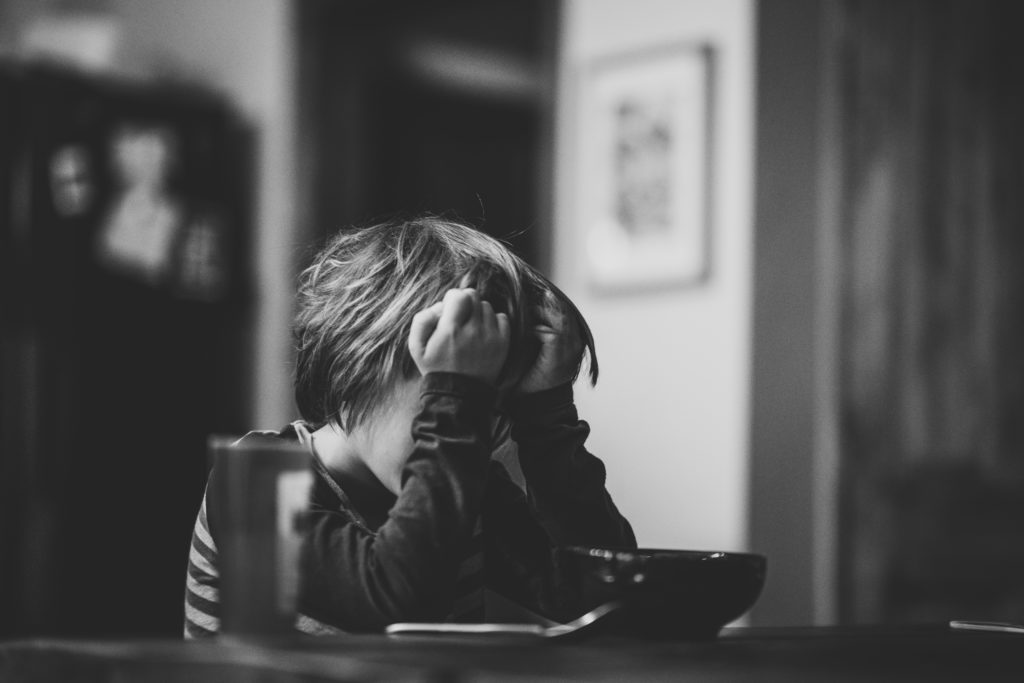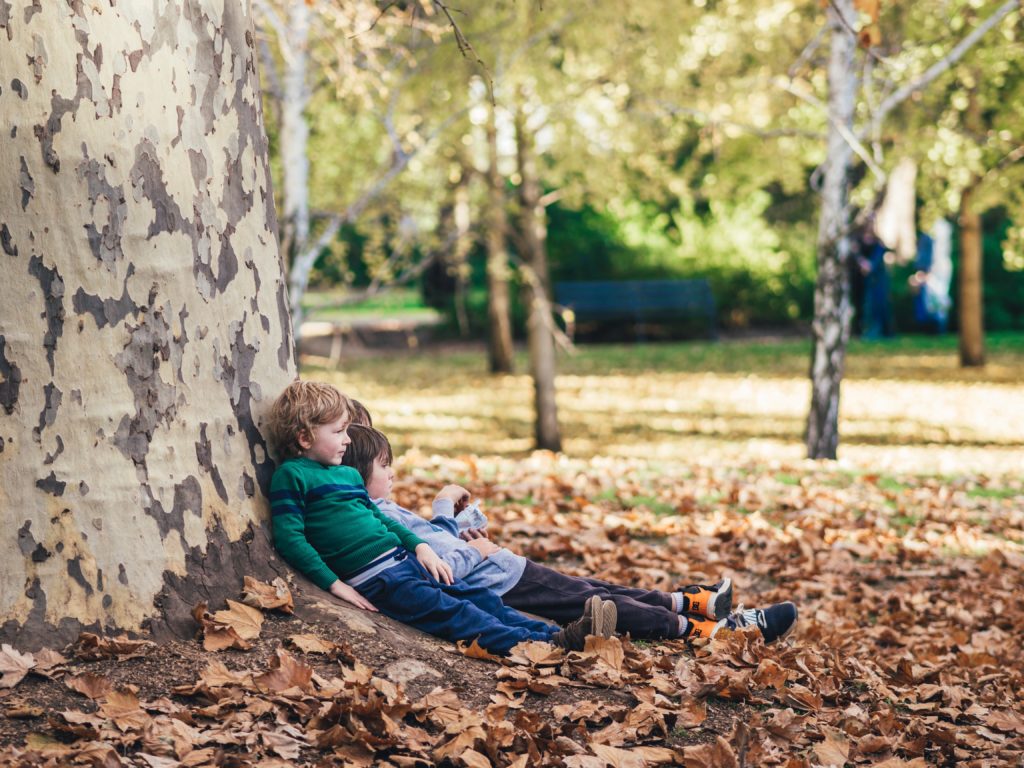When Your Homeschool Day Is Going All Wrong
We’ve all had them. This is what real homeschool moms recommend for when your homeschool day is going all wrong. Special thanks to my friend, Amy Sloan of Humility and Doxology, for putting together this amazing compilation!
We’ve all been there. Sometimes the homeschool day just seems to be going all wrong.
Everyone is grumpy. The kids seem to have forgotten everything they have ever known. They’re more interested in fighting with Mom or with each other than they are interested in actually just doing their work.
What’s a homeschool mom to do on those terrible, horrible, no good, very bad homeschool days?
HELP! Our homeschool day is going all wrong!
In season 3 of the Homeschool Conversations with Humility and Doxology podcast, I asked each guest to share their best advice for what to do when the homeschool day is going completely off the rails. You may be surprised by how similar – and how simple – their advice turned out to be!
(You can find the complete interviews with each of these Homeschool Conversations guests in your favorite podcast feed or read the full transcripts at HumilityandDoxology.com.)
Tips and Tricks For When Your Homeschool Day Is Not Going Well
1. Go Outside (Mom, too)
One of the most common strategies suggested for salvaging a bad homeschool day is to go outside. This might mean sending the kids out in the yard to play or taking a nature walk as a family.
Or maybe it means Mom herself needs to take an outdoor break breathing in the fresh air and soaking in some sunshine.
Not only is it good for us to be out in nature in general, but not moving our bodies enough makes it harder for our kids (and us) to stay focused on seat work.
Often our emotions reflect our lack of movement, Kristen Rudd pointed out. She also noted that it gets hard sometimes to remember that our big kids need to have time to play, too:
“I find that I have to do a lot of apologizing when I let my emotions get the best of me, but I found that usually it’s when no one’s moved their body enough, or somebody needs a snack and a nap…Usually, it’s, ‘Move your body. Go outside, go take a walk, go sweep the deck off.’ When they were little, I actually would make them go around the house five times until they just had burned off some physical energy. If they came back, I’m like, “Okay, just go play.” At this point, nothing’s getting done. You’re not learning. We are embodied people. We live in bodies and I think … especially when they’re older, we don’t really play as much.”
“I would say one of my probably default things to try is to just bundle everybody up and go outside for a little fresh air. That’s probably my go-to strategy for when the day is going off the rails. Inevitably it takes us a while to find all our hats and gloves and coats and nobody really wants to and everybody’s grumbling. If we just get out the door, it seems like walking around a little bit in the fresh air helps everybody’s mood to settle somewhat. That’s something that we turn to a lot.”
Keren Chu finds that time outside in nature puts things back into an eternal perspective:
“On other days when it’s extra difficult, I just stop and take a break. I think that’s what homeschooling had given us, the freedom to do that, to take a break and take a breather. Other times, I just say, ‘Okay, kids. Let’s go outside for a nature walk,’ and that’s what we do. I need that too. I need the fresh air. It’s been helpful for me. Jesus said, ‘Just look at the birds of the air for they neither sow nor reap.’ It reminds you, ‘Look at God’s world,’ then you’ll realize how infinitely small you are and how great our God is. Sometimes you get so caught up in the small details and even in the education of our children. When you look at the grand scheme of things, you realize what ultimately matters.”
“There’s no bad weather, only bad clothes” is a maxim that Anne Guarnera has adopted in her family, especially during this pandemic. She added, “I have found being outdoors an instantly calming mechanism for myself and my kids, and rain walks great, snow walks great. I don’t recommend ice walks…but otherwise go outside and do it.”
Kelly Cumbee points out that nature is healing for Moms, too:
“Even for myself, I have found that if things are just horrible, if I just go outside it really does help. Being outside and being in nature, to me, is so important…Being in touch with nature and knowing your local trees and birds and flowers and those things, knowing your seasons, your weather… The more time you spend outside, the more– I think it’s just healing to your soul anyway, being out, and just seeing the clouds. You don’t have to memorize anything about clouds, you just rest and lift your eyes up to God. The heavens declare the glory of God. It’s healing just to go outside and be in nature…. It’s even healing for me to go out and take a walk and just de-stress. It clears your mind, then you can come back and reset.”
2. Take a Break
When everyone is crying, the learning has stopped. Sometimes the best thing you can do is just call a full stop to the day. Put the textbooks away; they’ll still be there tomorrow. Try something fun, unusual, or calming instead!
Jami Marstall has teens in her homeschool, and she smilingly noted that a fun coffee drink goes a long way with older girls. She sometimes tells them, “Let’s go get a fun coffee and get this day turned around.” Jamie also encouraged “being willing to be a little bit silly and find something to laugh about.” It’s hard to stay grumpy when you find something to laugh about together!
Of course, ice cream is always a good idea, too! Colleen says, “You can go get drive-thru ice cream. I have taken my kids to ice cream for lunch on really bad days, and there’s nothing like eating dessert for a meal that turns families around and makes people start laughing. Really, let it go. It is okay. You can always, always, always pick up the academics.”
Tawnya Vinyard finds that taking a hard break on a bad day restores relationship:
“I would say get off course. We always prioritize relationship in our homeschool more than the actual bookwork. If you are struggling over a curriculum, get outside, go ride your bike to the park or ride around the neighborhood, take a walk. Don’t make it educational, just literally take a hard break, and really just focus on the relationship, filling that child up or children up. If you can’t get outside, we like a good board game… We’re not going to get Sum Swamp out to play, we’re going to get Catan or Ticket to Ride or something more fun that they enjoy. Monopoly’s my son’s favorite, so something like that…A hard break on bad days always seems to work.”
Homeschooling means we’re all around each other all the time. Jessica Jensen pointed out that sometimes we just all need a break from each other for a bit, especially when you add tweens or teens to the mix: “Sometimes we just need a time out. We seem to need to go to our own places and be alone for a little bit and cool down and try again. That works…Because pushing through, it doesn’t work.”
When I asked Jennifer Pepito what she’d suggest for the homeschool day going all wrong, she laughed and advised, “Definitely stop. Just stop because I think there’s a point where our kids can’t learn anymore and if we think that pushing them to tears is going to result in something, we’re wrong… I think that it is important if you want to homeschool to establish that you’re the boss, but then also be a respectful boss. If you see that your child’s worn out with what they’re trying to learn and it’s just not working, stop and play a board game. You’re doing math, they’re crying, stop and play a math game. You’re doing a grammar worksheet, they’re crying, stop and read a book out loud and talk about what you read…There are more fun ways to accomplish the same purpose with our children, ways that are respectful and kind… There are other ways to accomplish the same purpose beside doing every single thing that a curriculum tells you to do.”
Sometimes taking a break looks like taking time to address our own mindset as homeschool moms. Are we buying into lies about our own success or failure as the homeschool mom? Angela Reed finds that on those really bad days she often needs to take a break on her own to pray and readjust her mindset: “In the midst of a homeschool day that’s unraveled it feels like, ‘Oh my goodness. This ship is sinking and I’m the captain and I failed.’ I go in the room and I pray and I speak against those lies.”
Isn’t this one of the freedoms homeschooling has give us after all? Keren Chu reminded me, “that’s what homeschooling had given us: the freedom to …take a break and take a breather.”
Related: Should You Homeschool Your Gifted Child?
3. Keep Going
We just talked about how often on a homeschool day going wrong you need to take a break. But sometimes? The best thing you can do is to keep persevering, especially if you’re in a season of several hard days in a row!
But persevering on a bad day doesn’t mean gritting your teeth or resorting to yelling.
Sometimes we just need a change, not a break. Sometimes we need to cut back, not stop completely.
Amber Johnston advised moms, “Look at what is giving you life and what’s going well, and how you can maybe protect that or do more of it. Maybe you don’t need to do more, maybe it’s just a protection of [what’s giving you life]…Some things I still am planning to implement, but they’re put away right now because this wasn’t my season for that…I read one author who said that, ‘A change is as good as a break,’ or something similar. Sometimes it’s just changing the way that you’re doing something that could make it feel refreshing again.”
Amber also shared a quote that impacted the way she thinks about her homeschool: “Cut back until you have peace. Keep cutting back until you have peace.”
Katie Waalkes has a super practical suggestion for those days when you’re struggling to push through. She prepares a “Bad Day Box” ahead of time for just this situation! She explained, “It’s just a box of a few educational activities. Basically, we have a list of podcasts and YouTube channels and fun educational videos to watch on different streaming services in that box. We have some Usborne fun books that we don’t normally have out, some educational games. Just kind of a box for when we’re having a rough day and we need to go off track, we can go to that and pull from some fun educational resources and just mix it up in our family, and that’s been a lifesaver.”
A Bad Day Box is for moms, too! Katie includes M&Ms in hers and a ring of encouraging Bible verses. We all need an emergency supply of chocolate somewhere, right?!
And don’t forget to ask your kids for advice! Sometimes the source of the struggles may not be what you think it is.
Aimee Otto likes to collaborate with her children to find creative solutions. She will ask them, “What’s making this hard for you or what would make this easier right now?” When Aimee’s daughter hit a stage where she cried over the math page every day, Aimee asked this question and discovered that her daughter was feeling overwhelmed by “so many problems.” So Aimee started cutting shapes out of the math page to remove a few of the problems. It was a creative solution that enabled her daughter to feel heard without quitting math altogether. “I think … if you can just collaborate with them a little bit and see if they have any insight into why you’re hitting this bump in the road, that can sometimes be helpful,” Aimee concluded.
Poetry tea time or read aloud can also be a great way to bring joy to a bad homeschool day. Anne Guarnera has found that “on a hard day, poetry tea time pretty much often turns my day around. Kids love cookies and my kids love poetry and they consider it a major treat. I don’t think they realize that sometimes I just do that to keep them quiet and eating things while I relax and read them poetry, but it works for all of us. We consider it a really special time.”
4. Focus on Relationships First
Relationships are more important than checklists. Those horrible homeschool days can feel so huge in our minds when we’re right there in the middle of one. But at the end of the day, the relationships we have with our children are way more important than any one math worksheet or any one project.
I often find it helpful to think about what kind of relationship I want to have with my children in 20 years, when our homeschooling experience is way back in the past. Will I really remember (or care) about the day we didn’t get to everything on our checklist? Or will it matter more to me that we love each other and want to be around each other?
How might that big picture perspective affect the way you handle your homeschool day that’s going all wrong?
Maybe it means you need to start by apologizing to your kids. Eek. I don’t always like to hear this advice, but it was a recurring reminder from this season’s podcast guests.
Kristen Rudd said, “Take a break, think about what you’ve done, and go back and apologize to your children, because usually when it goes off the rails, it’s because I have lost my cool. I’ve gotten frustrated in some way and my kids deserve an apology, and I’ve been in the wrong. I found that apologizing and explaining, not as a way of excusing, but as explaining, “I’m just frustrated and I took it out on you and I’m sorry,” I found my kids to be so receptive to that. It doesn’t make everything better, but usually, it calms down whatever’s going on. There are some days when you just have to be done, and there are some days when you have to dig in and try again. It’s a matter of intuition and knowing and making a mistake, and learning from it. Yes, go outside, take a breath, and apologize. That’s usually what solves it.”
Marc Hays pointed out that sometimes we parents like to think we’ve figured out the issue…but we might be wrong. In fact, Marc said, sometimes we’re the problem:
“That doesn’t mean that you’re the only one to blame in the situation, but it could be that you are exacerbating the problem. Perhaps by not rightly assessing what their problem is but being pretty sure that you’re going swoop in and fix it. Then come to find out, an hour or two later and 10,000 tears later, that that wasn’t the problem to start out with. Or, it was only part of the problem, it was a very minor part of the problem, and swooping in without pausing to assess (which usually requires asking questions and listening) sometimes results in much longer frustrations than if we started out more slowly. Sometimes, we don’t know what questions to ask. Sometimes, it just takes some long moments of silence to find a better question. I say all this personally, because I’m super guilty of it. Super guilty of thinking, ‘I know how to teach, and they’re not learning, so it’s their fault.’ Quite often it has nothing to do with teaching or learning. It has to do with what’s going on with them.”
Sometimes hard homeschool days come as a result of periods of trauma. Jennifer Dow has walked through tragedy, and she has seen God working in the midst of that: “I would remember, I think it’s Isaiah 54, that verse where God says, ‘And I, myself, will teach your children.’ I’ve constantly been amazed, and we’ve been through a lot of tragedy in our home in the last three years, how much that is true. That even when everything is going crazy, that my children learn in spite of me and my capacity, but how much that God really does love them more than I even can. Every single time. If I’m willing to surrender to that and follow His urging, wherever it leads, even if it’s something that I’d rather not do, then we’ll be okay.”
Dr. Kristin Moon encouraged us to show grace to our kids… and to ourselves:
“Show grace and accept grace. Just cover the whole thing with grace. There is no shame in when you’re having a really terrible, horrible, no good bad day to just walk away from the books. Relationships always supersede getting through the curriculum. Because if you have a bad attitude, if your student has a bad attitude towards you because you’re having a bad day, because words have been exchanged or maybe looks or whatever, they’re going to have a hard time receiving what you’re trying to teach them. It’s probably going to just be scrapped anyway…Just understand that you’re going to have bad days, that it’s a marathon and not a sprint, you’re going to get through it, but ultimately the more important thing is not that you finished the textbook at the end of the year, but that you’ve deepened your relationships, that you’ve worked on character.”
Trying to force things and power through will likely lead to more tears and less learning. Colleen Kessler reminded us, “Connection matters more than anything, and if you guys are all in tears over academics, nothing’s going to sink in anyway. Most parents, especially new homeschooling parents worry that if they just put it aside, they’re never going to get back to it, because their kids are going to play them and keep crying when math comes. And they might, they absolutely might.
That’s when you use the connections in the heart, relationships that you’ve built, and sit down and say, ‘Hey, look, we’ve let math go for a little while because I know that it’s been causing problems between us, but I also know that you’ve been laying it out a little thick when math comes back around and it is something that needs to get done, so we need to come up with a solution together to solve this aversion you have to math or whatever it is.’
By building the connections and building the relationships in those crazy chaotic moments, you’re able to have those conversations, even with your littlest, for sure with your teens, but even with your littlest, you can say, ‘Hey, come on, you’re playing me here. Let’s get back to it, you can cry and throw a temper tantrum afterwards. We just have to get through these five problems.’
But in those first moments when you are all struggling, you really need to put it aside. You can go for a drive and put on an audiobook and still call that school.”
Encouragement for the Hard Homeschool Days
Hugs, Mama. If you’re having a hard homeschool day, I hope these encouraging and challenging words from veteran homeschool parents bring some much-needed perspective and hope to your day.
Go outside (even if it’s raining).
Take a break if you need to (ice cream optional).
Keep going and don’t quit (sometimes you just need to change things up).
Prioritize the relationships in your home (people are more important than worksheets).
Eat some chocolate. Say a prayer. Take a breath.
This homeschool gig might be the best hard thing you’re ever going to do…and you’re doing an amazing job.
A Note From Colleen:
Isn’t this so encouraging?!
You should also know that Amy Sloan and her husband John are 2nd-generation homeschoolers to 5 children from 5 to 15 years old!
The Sloan family adventures together in NC where they pursue a restfully-classical education by grace alone. If you hang out with Amy for any length of time you’ll quickly learn that she loves overflowing book stacks, giant mugs of coffee, beautiful memory work, and silly memes. At any moment she could break into song and dance from Hamilton, 90s country music, or Shakespeare. Amy writes at HumilityandDoxology.com and hosts the weekly “Homeschool Conversations” podcast.







